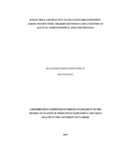| dc.description.abstract | Background: Breastfeeding is an significant tool of preventing childhood illnesses,
obesity, and hypertension later on in life. In addition, it reduces the cost to the family
and the entire country. South Sudan faces a great deal of challenges, particularly in the
health sector. Appropriate practices that support exclusive breastfeeding in the 1st six
months will cause a major impact on reduction of childhood morbidity and mortality
in the young land.
Objective: To assess the knowledge and practices of exclusive breastfeeding in
mothers with infants between 9 and 12 months of age attending the immunization and
the outpatient clinics in El-Sabbah Hospital and to identify factors that affect
exclusive breastfeeding.
Study Design: Cross sectional descriptive hospital based study.
Study Area: El-Sabbah Hospital, immunization and the outpatient clinics.
Methodology:Consequative sampling was used to select mothers with children aged
9 to 12 months in both immunization and the outpatient department were interviewed.
A questionnaire was used to extract the information on the sociodemographical
factors, practices that support the success of exclusive breastfeeding and basic
knowledge on the advantages of breastmilk and breastfeeding. SPSS was used in data
entry and analysis. Both univariate and multivariate logistic regression were used to
analyze the factors that affect the success of exclusive breastfeeding.
Results: 384 mother, attending immunization and outpatient department were
interviewed. The majority of the mothers interviewed were aged between 21 – 25
years (43.5%), had 2-4 children (55.5%) and had primary education (48.2%). The rate
of exclusive breastfeeding was found to be 63.2%. The majority of mothers initiated
breastfeeding in the first hour of delivery (76.8%).Mother`s skin to skin contact with
their babies immediately after birth was reported in 70%,while 76.8% initaited
breastfeeding in the first hour,and 98.1% roomed in with thier babies.59.4% of
mothers did not offer prelacteal feed to their babies.While milk expreesion wasn`t
practiced by most of the mothers. Breastmilk was reported to be nutritious
(mean=1.15, SD=0.53).Knowledge on use of EBM when mother is away was found
to be low (mean 3.15,Std 1.06).The majority of the respondents knew that the
xii
definition of exclusive breastfeeding involved giving only breast milk and medicines
if indicated (mean=1.39, S.D=0.54).
The Univariate analysis showed that parity and mother`s level of education were
significantly associated with exclusive breastfeeding (p<0.05). There was no
statistical significant association between occupation, age of the mother, mode of
delivery and exclusive breastfeeding (p>0.05).
Conclusion: Most of the mothers had good knowledge on the benefits of exclusive
breastfeeding and the definitions of exclusive breastfeeding.
The early practices supporting breastfeeding are well practiced with rate of exclusive
breastfeeding reaching 63.2% at 6 months of age .Parity and mother`s level of
education were the socio-demographic factors that significantly affected exclusive
breastfeeding. | en_US |
| dc.description.department | a
Department of Psychiatry, University of Nairobi, ; bDepartment of Mental Health, School of Medicine,
Moi University, Eldoret, Kenya | |

